Sustainable Development Goals: Where is the Common Good?

Photo: sustainabledevelopment.un.org
Prof. Kamran Mofid*
Founder
Globalisation for the Common Good Initiative (GCGI)
(This article is dedicated to the children of the world, the torch bearers of the next sustainable agenda, who are the unfolding story of the decades ahead. May they rise to the challenge of leading our troubled world, with hope and wisdom in the interest of the common good to a better future)

Photo: sustainablereview.net
Abstract
"Already a billion of us go to bed hungry every night. Not because there isn't enough, but because of the deep injustice in the way the system works."-OXFAM International
In the year 2000, the world leaders adopted the Millennium Declaration: A commitment to a peaceful, prosperous, and just world. The declaration included a set of targets for development and poverty reduction to be reached by 2015. These came to be known as the Millennium Development Goals (MDGs).
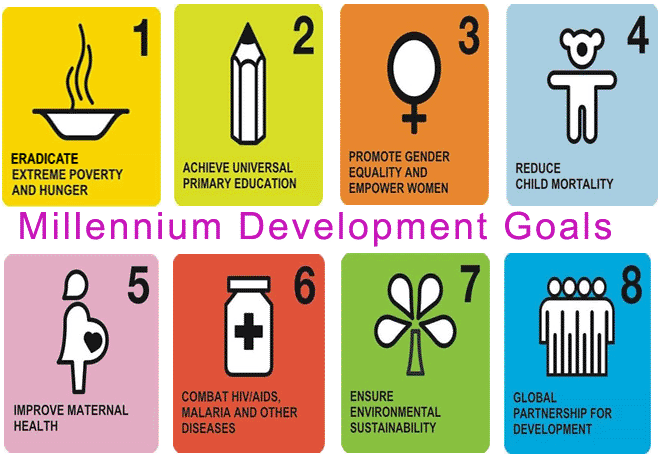
A cursory look at the world today can easily show that the MDGs journey has been nothing but a big disappointment: Where is “a peaceful, prosperous, and just world “? Hopes were raised and hopes have been dashed.
These goals will expire on December 31, 2015, and will be replaced by yet another set of gaols, namely the Sustainable Development Goals (SDGs).
I would argue that just as with the MDGs, the new proposed SDGs will not change the world for the better, as long as they are guided and inspired by the neo-liberal values and agenda which shaped the MDGs. These values are not compatible with the socio-economic and environmental goals we so desperately need to achieve and implement.
As well as setting goals every now and again, what people need to hear is an account of why there is so much suffering in this world. Why is there such a sickening level of abject poverty and inequality in and between nations? Why is there such a level of global mistrust and injustice? Why is there so much environmental degradation? Why are we told there is not enough money for education, health, sanitation, drinking water and social services, but there is always plenty for military expenditures and waging wars? If we try to answer these questions first, then there would be a greater possibility of attaining those goals.
To find those answers we need to appreciate that the ethos of neo-liberalism is destructive of the very SDGs we are seeking to establish in our relationships in society and with Mother Nature. The current neo-liberal capitalist paradigm – economic liberalization, marketisation, privatisation, free trade, endless economic growth, profit-maximisation, cost-minimisation, fierce competition, huge bonuses for short-term gains, and more – provide strong incentives to ignore distributive justice and ecological sustainability, the very aims of the SDGs.
When economics and politics are based on the worst aspects of human nature, then societies become riddled with inequality, violence and mistrust.
To try to solve global crises, without first questioning the reasons for their continuing existence, will be a wasted and costly journey to nowhere. As Einstein put it: “Insanity is doing the same thing over and over and expecting a different result".
If the SDGs are to be reached, it requires a different path with a different set of values. Then an answer to these pertinent questions may be found.
Introduction

Photo: sustainabledevelopment.un.org
At the outset, it may be salutary to recall some words from John F. Kennedy’s Inauguration Speech: “If a free society cannot help the many who are poor, they cannot save the few who are rich”.
No profound philosophy or deep erudition will be found in this article. I only aim at putting together some remarks which are inspired by what I hope is common sense, and mostly further inspired by the wisdom of those who have gone before me. All that I claim for the recipes offered to you is that they are as such confirmed by my own observation and, most importantly, the experience of my life journey, both personally and professionally. I hope others thinking about these same issues may find my contribution useful, but my main concern is to help initiate a debate on building a path to peace, justice and sustainability in the interest of the common good.
Today our global family is facing a multitude of enduring and potentially catastrophic crises. For me, the answers lie in simplicity. There is no need to complicate matters further. After all, in the wise words of Leonardo da Vinci, “Simplicity is the ultimate sophistication.”
Before going on, let me share with you the philosophy, the vision and values which underpin my thinking and have guided me in offering this suggested path for the common good. Here I am most humbly inspired by Lao Tzu,a mystic philosopher of ancient China, considered the founder of Taoism. He said:
Some say that my teaching is nonsense.
Others call it lofty but impractical.
But to those who have looked inside themselves,
this nonsense makes perfect sense.
And to those who put it into practice,
this loftiness has roots that go deep.
I have just three things to teach:
simplicity, patience, compassion.
These three are your greatest treasures.
Simple in actions and in thoughts,
you return to the source of being.
Patient with both friends and enemies,
you accord with the way things are.
Compassionate toward yourself,
You reconcile all beings in the world.1
Sustainable Development Goals (SDGs)
One of the main outcomes of the United Nations Conference on Sustainable Development (Rio+20), held in Rio de Janeiro in June 2012, was the agreement by Member States to launch a process to develop a set of sustainable development goals (SDGs).
Draft goals were presented to the UN General Assembly in September 2014 in New York. A year of negotiations follows, with the final version of the goals scheduled to be affirmed in September 2015.
The Goals
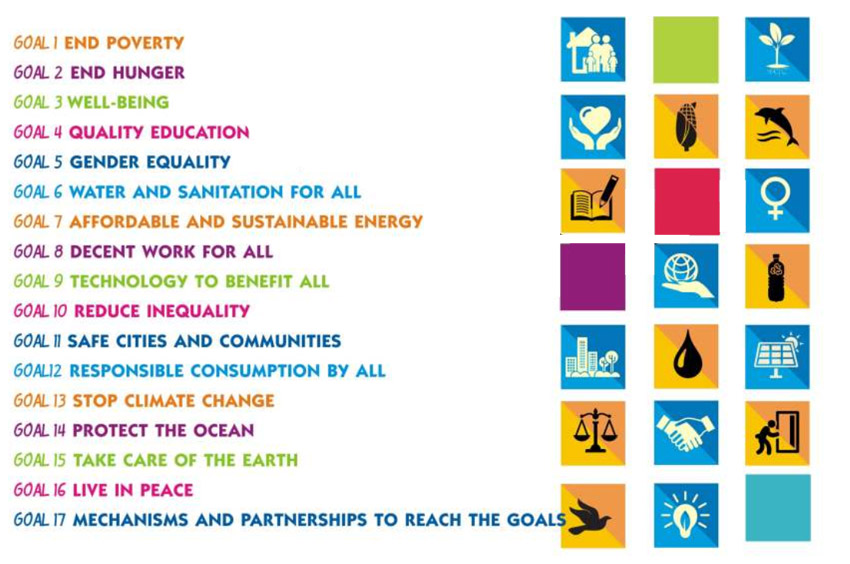
The 17 proposed goals, to be attained by 2030, include the following: end poverty everywhere; end hunger, improve nutrition and promote sustainable agriculture; attain healthy lives for all; provide quality education and life-long learning opportunities for all; attain gender equality, empower women and girls everywhere; ensure availability and sustainable use of water and sanitation for all; and ensure sustainable energy for all.
In addition, the goals were aimed at promoting sustainable economic growth; full and productive employment and decent work for all; sustainable infrastructure and industrialisation; reducing inequality within and between countries; making cities and human settlements inclusive, safe and sustainable; and promoting sustainable consumption and production patterns.
Also included were goals to tackle climate change and its impacts; conserve and promote sustainable use of oceans, seas and marine resources; protect and promote sustainable use of terrestrial ecosystems, halt desertification, land degradation and biodiversity loss; achieve peaceful and inclusive societies; access to justice for all; and effective and capable institutions to strengthen the means of implementation and the global partnership for sustainable development. 2
So far so good: I acknowledge and accept, of course, that the SDGs 17 goals are desirable. Nobody in their right mind could disagree with the goal of reducing extreme poverty and hunger or ensuring environmental sustainability for example. However, the means of achieving these goals are, as in the past, informed by the values of neo-liberalism. This makes the means incompatible with humane and just values, making the objective ultimately unachievable.
Today, in many parts of the world, the so-called “free” market, the consumerist culture, and “Black Friday” sales, have become increasingly dominant, and are now seriously threatening our global future, both in terms of our care of the planet and in increasing societal rivarly and conflict.
In the process we have lost trust in everything: politics, economics, politicians, business, CEOs, governments, the media, and even the UN itself, including the many goals they set. This is why I believe it essential for these SDGs to be realised if UN wishes to become a vehicle of hope for a better global future. In the global society in which we all now live, it is vital for our common survival and wellbeing that we build cultures of trust, being prepared to take risks for the common good.
Trust surely comes from the experience of a relationship - an in-depth experience - which by its nature is rooted in values that are not necessarily economic or monetary.
At the basis of such trust is an understanding that, in spite of our differences, we have our humanity in common. Archbishop Desmond Tutu speaks of “that African thing, Ubuntu” – the notion that a person is only a person through other persons. A person with “Ubuntu” is open and available to others, all others, for we are incomplete without each other. Ubuntu echoes the insight of John Donne that “No man is an island ….. I am involved in mankind”, and that was in the seventeenth century, long before globalisation, the UN and the SDGs.
What might be a path to attaining the SDGs?
“As the evidence increases that the current economic model is unsustainable there is growing pressure for new economic policies. Will the SDGs lead to a structural change in the global economy or a continuation of business as usual?”
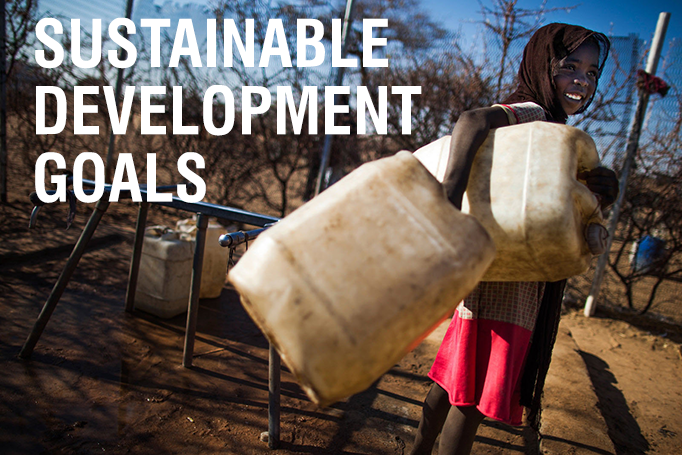
‘Why has the international community, despite its good intentions, made so little progress on overcoming poverty?’
Photo: cesr.org
Today’s world, it seems, has become a world of continuing and deepening crises. Wisdom, must surely compel us to ask: Why?
Is it lack of money or resources? Or Lack of technology and IT? Or Lack of people holding PhDs and MBAs? Or lack of goals set by this organisation or that? No. What we lack is moral and spiritual imagination and compass. We lack wisdom and choose wrong, harmful, and worthless ways.
Our crises can only be addressed, reversed and resolved, and our goals can only be achieved, if we change direction, adopt new values and become concerned with life’s bigger picture. We must reconnect ourselves with nature. We must begin to respect and admire nature and be inspired by it. Moreover, as members of the household of humanity, we must provide security, sanctuary and constructive engagement for all of our human family. Sustained by the bounty of all, called by the Sacred, and animated into action by the Spirit of peace, Justice, and Reverence for All Life, we must be guided by values inspired by nature, to brighten our path to build a world fit for the common good.
If we want to realise anything good in life, including any goals we may set ourselves, we must begin, first and foremost, by focusing on some fundamental and enduring questions of human meaning and value. Questions such as:
1. What does it mean to be human?
2. What does it mean to live a life of meaning and purpose?
3. What does it mean to understand and appreciate the natural world?
4. What does it mean to forge a more just society for the common good?
By their very nature, these questions involve thought and discussion around spirituality, ethics, morals and values.
This means that our lives are connected not only to knowledge, power and money, but also to faith, love and wisdom. Unless the questions we ask encompass the full spectrum of these emotions and experiences, we’re unlikely to find the answers we are looking for, or to understand them in any depth, let alone solving problems and attaining goals.
The bitter harvest that neo-liberalism has brought us all is the result of its ignorance and inability to accept that our life journey is not all about economics, money and finance. We should acknowledge that our crises are not economic only, but spiritual.
This is why I firmly believe that we must begin by discussing values and to highlight why they matter.
The benefits ofneo-liberal globalisation are limited and are based on individualism, greed, self-interest and economism (regarding human societies primarily aseconomic systems inwhichfinancialconsiderations alonegovernchoicesand decisions). Other fundamentalvaluessuchasfaith, spirituality, justice,love,compassion, sympathy, empathy, co-operation, and the common good areneglected.
Before I proceed further, I wish to tell you about my own journey for peace, justice and sustainability which has transformed me from an “economist as usual” into “an economist for the common good”.
Becoming an economist for the common good
Perhaps the best way I can demonstrate my journey as an economist is by quoting a passage from an Open Letter I wrote to the editor of the Financial Times. I was prompted to write this letter in a response to an editorial which was published on 13 November 2013, under the title of “The new economics: Teaching of discipline needs to rely less on abstract models”.
Sir, I have read your editorial ‘A new economics’ with much interest. You conclude your piece by asking the economics profession to substitute a little humility for pretension as the first step to a new economics: I wholeheartedly agree.
However, may I respectfully ask you to let me know if you had ever written an editorial in similar vein before the crash of September 2008? Had you ever encouraged your readers to think about economic pluralism? Have you ever encouraged a dialogue of disciplines, ideas and visions in the study and practice of economics: a dialogue between economics, ethics, philosophy, spirituality, and the common good? Have you ever encouraged the wealth-creators that read your paper to reflect on ‘Why’ and ‘How’ wealth is produced and, more importantly, when wealth is created, ‘What’ it is going to be used for?
Knowing how busy you are, may I share with you a short passage on the subject from a book I wrote in 2005, well before the crash of September 2008:
‘From 1980 onwards, for the next twenty years, I taught economics in universities, enthusiastically demonstrating how economic theories provided answers to problems of all sorts. I got quite carried away by the beauty, the sophisticated elegance, of complicated mathematical models and theories. But gradually I started to have an empty feeling.
‘I began to ask fundamental questions of myself. Why did I never talk to my students about compassion, dignity, comradeship, solidarity, happiness, spirituality – about the meaning of life? We never debated the biggest questions. Who are we? Where have we come from? Where are we going to?
‘I told them to create wealth, but I did not tell them for what reason. I told them about scarcity and competition, but not about abundance and co-operation. I told them about free trade, but not about fair trade; about GNP – Gross National Product – but not about GNH – Gross National Happiness. I told them about profit maximisation and cost minimisation, about the highest returns to the shareholders, but not about social consciousness, accountability to the community, sustainability and respect for creation and the creator. I did not tell them that, without humanity, economics is a house of cards built on shifting sands.
‘These conflicts caused me much frustration and alienation, leading to heartache and despair. I needed to rediscover myself and real-life economics. After a proud twenty-year or so academic career, I became a student all over again. I would study theology, philosophy and ethics, disciplines nobody had taught me when I was a student of economics and I did not teach my own students when I became a teacher of economics.
‘It was at this difficult time that I came to understand that I needed to bring spirituality, compassion, ethics and morality back into economics itself, to make this dismal science once again relevant to and concerned with the common good.’3
Defining the Common Good
Explaining the common good requires some familiarity with the notions of justice in social and economic terms.
Defining Justice
Functionally, as defined by the Center for Economic and Social Justice (CESJ), "justice" is a set of universal principles which guide people in judging what is right and what is wrong, no matter what culture and society they live in. Justice is one of the four "cardinal virtues" of classical moral philosophy, along with courage, temperance (self-control) and prudence (efficiency). (Faith, hope and charity are considered to be the three "religious" virtues.) Virtues or "good habits" help individuals to develop fully their human potential, thus enabling them to serve their own self-interests as well as work in harmony with others for their common good.
The ultimate purpose of all the virtues is to elevate the dignity and sovereignty of the human person.
Distinguishing Justice from Charity
Whilst often confused, justice is distinct from the virtue of charity. Charity, derived from the Latin word caritas, or "divine love," is the soul of justice. Justice supplies the material foundation for charity.
Charity offers expedients during times of hardship. Charity compels us to give to relieve the suffering of a person in need. The highest aim of charity is the same as the highest aim of justice: to elevate each person to where he does not need charity but can become charitable himself.
True charity involves giving without any expectation of return. But it is not a substitute for justice, nor a substitute for being a just person.
Defining Economic Justice
Economic justice, which touches the individual person as well as the social order, encompasses the moral principles which guide us in designing our economic institutions. These institutions determine how each person earns a living, enters into contracts, exchanges goods and services with others, and otherwise produces an independent material foundation for his or her physical sustenance. The ultimate purpose of economic justice is to free each person to engage creatively in the unlimited work beyond economics, that of the mind and the spirit.4
Defining the Common Good
Having defined the above terms, I would like begin by sharing the gist of an article “Whatever Happened to the ‘Common Good’?” by Jim Wallis:
Put very simply, as Wallis noted, the common good has origins in the beginnings of Christianity. An early church father, John Chrysostom (c. 347–407),once wrote: “This is the rule of most perfect Christianity, its most exact definition, its highest point, namely, the seeking of the common good . . . for nothing can so make a person an imitator of Christ as caring for his neighbours.” 5
The notion of the common good has both religious and secular roots going back to Catholic social teaching, the Protestant social gospel, Judaism, Islam, and in the American Constitution itself, which says that government should promote “the general welfare”. A commitment to the common good could bring us together and solve the deepest problems this country and the world now face: How do we work together? How do we treat each other, especially the poorest and most vulnerable? How do we take care of not just ourselves but also one another?
The common good is also the best way to find common ground with other people—even with those who don’t agree with us or share our politics. Everybody, liberals and conservatives, east and west, could come together and affirm the moral standard of the common good.
The ethical and spiritual teachings of all religions, and their striving for the common good, can provide us with a clear and focused model of moral behaviour in what we term “the market-place”. An overall ethical orientation to the challenges of daily economic activity can be related to each of our faith traditions.
In the Jewish tradition we see the effort to balance pragmatic considerations of economic efficiency with ideals of interpersonal equity and social justice. The key themes of Christian and Islamic thought are respectively a concern for human dignity and a concern for communal solidarity. These three themes are not separate: they overlap and interlock, and they are shared by all three traditions. Together they form an inspiring mosaic of Western religious ethics.
The traditions of the East have somewhat different themes from those of the Abrahamic religions; nonetheless, there is much that is similar. The importance of humility and patience characterises the Hindu view of economic life. In Buddhism, the theme that resonates most strongly is compassion; in Confucian thought it is reciprocity. These, also, are not separate themes, but overlapping and interlocked. The mosaic they form is not sharply distinct from that of the Western traditions. Related to the marketplace, it would inspire businessmen to exhibit mutual consideration, while individual achievement would not be at the expense of communal solidarity. Steady economic and moral improvement would be pursued with humility and patience. These must become the guiding principles, the vision behind setting goals that aspire to change the world for the better. The marketplace is not just an economic sphere: ”It is a region of the human spirit”. 6
From a non-religious perspective, in modern political times, the term "common good" is closely associated with the 17th-century British philosopher John Locke, who argued that when people enter a society they give up some liberties to gain protection of a larger set of liberties and rights as part of a social contract. A society knitted together by the common good guarantees rights that would not exist in a pre-social setting. Locke used this explanation to rationalise the establishment of a parliamentary government that would be responsible for assuring the public welfare. Indeed, for example, in the American Constitution itself, the notion of the common good is clearly adhered to when it notes that government should promote “the general welfare”.
Thus, it is time to question the functionality of the existing economic system that has created a massive and widening gap between a few super rich and the many in abject poverty. We need to examine the soundness of extracting growing profit from a highly leveraged and unsustainable real sector in the face of massive numbers of disenfranchised people who are deprived of a potentially prosperous economic life. We need to question the ability of mother earth to support the extravagance of our blind and ignorant consumerism. We also need to put self interest in perspective, and balance it with concern for the common good and for other species and the earth.
We should recall the wisdom of Adam Smith, “father of modern economics”, who was a great moral philosopher first and foremost. In 1759, sixteen years before his famous Wealth of Nations, he published The Theory of Moral Sentiments, which explored the self-interested nature of man and his ability nevertheless to make moral decisions based on factors other than selfishness. In The Wealth of Nations, Smith laid the early groundwork for economic analysis, but he embedded it in a broader discussion of social justice and the role of government. Today we mainly know only of his analogy of an ”invisible hand” and refer to him as defending free markets; whilst ignoring his insight that the pursuit of wealth should not take precedence over social and moral obligations.
We are taught that the free market as a “way of life” appealed to Adam Smith but not that he thought the morality of the market could not be a substitute for the morality for society at large. He neither envisioned nor prescribed a capitalist society, but rather a “capitalist economy within society, a society held together by communities of non-capitalist and non-market morality”. As it has been noted, morality for Smith included neighbourly love, an obligation to practice justice, a norm of financial support for the government “in proportion to [one’s] revenue”, and a tendency in human nature to derive pleasure from the good fortune and happiness of other people.7
Building a new economic system will demand challenging and novel ways of thinking, perspectives that encompass the broad swath of human experience and wisdom, from the natural sciences and all the social sciences, to the philosophical and spiritual values of the world’s major religions, and of indigenous peoples as well. The task before us is a daunting one, and wisdom in how to proceed will come from many sources, and must embrace the panorama of cultural and disciplinary perspectives. Let us not carry on constructing a global society that is materially rich but spiritually poor. Let us begin to construct globalisation for the common good, as a path to construct a just and sustainable world.
Values to Build a Better World
If we want to realise any goals, including building trust, we must, once again, begin to appreciate the significance of the value of values in all we do, as without life-affirming values, no strong and lasting foundations can be built and no goals can be realised.
“Values represent our guiding principles: our broadest motivations, influencing the attitudes we hold and how we act.”
‘We have to build a better man before we can build a better society.’-Paul Tillich
“Try not to become a man of success, but a man of value” Albert Einstein
“Do all the good you can, by all the means you can, in all the ways you can, in all the places you can, at all the times you can, to all the people you can, as long as ever you can.”-John Wesley

Photo: virtuesforlife.com
As it has been observed throughout history, in action and thought, people are affected by a wide range of influences. Past experience, cultural and social norms are some of the most important ones. Connected to all of these, to some extent, are our values, which represent a strong guiding force, shaping our attitudes and behaviour over the course of our lives. Our values have been shown to influence our political persuasions; our willingness to participate in political action; our career choices; our ecological footprints; how much money we spend, and on what; and our feelings of personal wellbeing, contentment and happiness; as well as our relationship with others, with nature and Mother Earth, to mention but a few.
We in the Globalisation for the Common Good Initiative (GCGI) have developed a model of what it would look like to put values such as love, generosity and caring for the common good into socio-political and economic practice, suggesting possibilities for healing and transforming our world.
To focus our minds, assisting us to see the big picture, I very much wish to offer for consideration and reflection the values of the GCGI, which we hold very dearly.
I firmly believe that if these or similar values are adopted by all SDGs stakeholders, and then seriously adhered to afterwards, then the attainment of these goals becomes much more possible.
We value caring and kindness
We value passion and positive energy
We value service and volunteerism
We value simplicity and humility
We value trust, openness, and transparency
We value values-led education
We value harmony with nature
We value non-violent conflict resolution
We value interfaith, inter-civilisational and inter-generational dialogue
We value teamwork and collaboration
We value challenge and excellence
We value fun and play
We value curiosity and innovation
We value health and wellbeing
We value a sense of adventure
We value people, communities and cultures
We value friendship, cooperation and responsibility
Having noted some possible values needed to build a better world, I now wish to suggest a possible path to a better world.8
A Path to a Better World:
The Globalisation for the Common Good Initiative
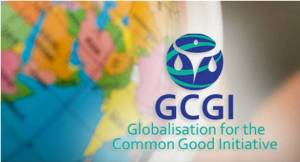
With a great passion for dialogue of cultures, civilisations, religions, ideas and visions, at an international conference in Oxford in 2002 the Globalisation for the Common Good Initiative (GCGI) and the GCGI Annual International Conference Series were founded.
A core aim of the Initiative has always been to focus on the “big picture” when we try to understand, appreciate, and face the challenges of the contemporary world. Whether it is war and peace, economics and the environment, justice and injustice, love and hatred, cooperation and competition, common good and selfishness, science and technology, progress and poverty, profit and loss, food and population, energy and water, disease and health, education and family, we need the big picture in order to solve the many pressing problems, large and small, regional or global.
The “big picture” is also the context in which we can most productively explore the big perennial questions of life - purpose and meaning, virtues and values, social justice and ecology. We recognise that our socio-economic problems are closely linked to our spiritual problems and vice versa. Moreover, socio-economic justice, peace and harmony will come about only when the essential connection between the spiritual and practical aspects of life is valued. In the words of Mahatma Gandhi, we should declare ourselves against the “Seven Social Sins”. These are:
Politics without principles
Commerce without morality
Wealth without work
Education without character
Science without humanity
Pleasure without conscience
Worship without sacrifice.9
The principle of the common good reminds us that we are all really responsible for each other – we are our brothers' and sisters' keepers – and must work for social conditions which ensure that every person and every group in society is able to meet their needs and realize their potential. It follows that every group in society must take into account the rights and aspirations of other groups, and the well-being of the whole human family. In the words of Robert Muller, former UN Under-Secretary General, we ought: “To see the world with global eyes; to love the world with a global heart; to understand the world with a global mind; to merge with the world with a global spirit”. 10
We can achieve this by:
Bringing the material consumption of our species into balance with the needs of the earth;
Realigning our economic priorities so that all persons have access to an adequate and meaningful means of earning a living for themselves and their families;
Democratising our institutions to route power to people and communities;
Replacing the dominant culture of materialism with cultures grounded in life-affirming values of cooperation, caring, compassion and community;
Integrating the material and spiritual aspects of our beings so that we become whole persons for the greater good
Conclusion: Co-creating “The Future We Want” in the Interest of the Common Good
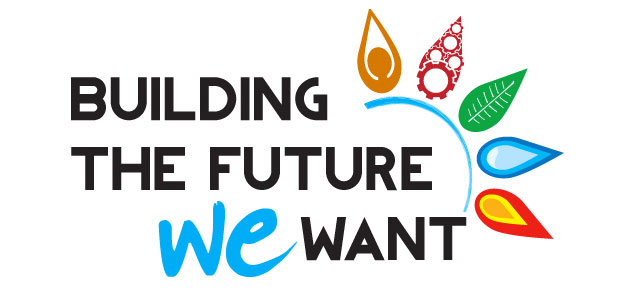
Photo: un.org
The future is indeed fraught with environmental, socio-economic, political, and security risks that could derail the progress towards the building of “The Future We Want”. However, although these serious challenges are confronting us, we can, if we are serious and sincere enough, overcome them by taking risks in the interest of the common good.
One thing is clear: the main problem we face today is not the absence of technical or economic solutions, but rather the presence of moral and spiritual crises. This requires us to build broad global consensus on a vision that places values such as love, generosity and caring for the common good into socio-political and economic practice, suggesting possibilities for healing and transforming our world.
To construct the foundations which are needed to build “The Future We Want” needs a path which is not exclusively economic and monetary. A path that is led by values which lend themselves to thought and discussion around spirituality, ethics, morals and values.
Moreover, in constructing "The Future We Want" we must include in our hopes for a better world the youth of the world, the next generations. If building close relations with our children and grandchildren is an investment into the future of a sustainable family, then, engaging with the youth is a contribution to the sustainability of a society. The youth today are laying foundation for the future "Big Life". The inter-generational dialogue, the passing of wisdom, and being inspired by commitment and idealism, is the answer to the creativity crisis the world is facing.
It is my firm belief that as long as all we do is guided by the values and principles of the current dominant neo-liberal ideology, we cannot hope for a better future and are thus unable to build “the Future We Want”.
The better future is guided by the common good. The idea of the common good is not some nebulous ideal, or one that only prophets, sages, philosophers and others have spoken of and lived by. It is a call for us all to live and love for others. It is to challenge the idea that we can survive as individuals and still develop and grow. Rather fullness of life can only be achieved through a unity, seen biologically and spiritually, which seeks to support, nurture and connect with one another. And if we do this, what is the reward? The reward is a world where all people are included, all are loved and all live full and complete lives. A world where people have meaning and purpose and direction and love which expands not only their own horizon but all those around them. A world where freedom and liberation is found for the weak and vulnerable. A world where the earth from which we arose is cherished rather than used and abused. A world where those fleeing persecution are welcomed rather than turned away or locked up. A world of peace and hope. A world of equity and justice. A world of reverence for Mother Earth. A world of sustainability for all.
Footnotes
1- Lao Tzu Reference Archive, Tao Te Ching Retrieved from:
https://www.marxists.org/reference/archive/lao-tzu/works/tao-te-ching/te.htm
2- Sustainable Development, Knowledge Platform, “Open Working Group proposal for Sustainable Development Goals” Retrieved from:
https://sustainabledevelopment.un.org/focussdgs.html
3- See further A comment on a Financial Times editorial (November 12, 2013) Retrieved from:
http://www.gcgi.info/blog/497-a-comment-on-a-financial-times-editorial-november-12-2013
4- Centre for Economic and Social Justice Defining Economic Justice and Social Justice | Center for Economic and Social Justice Retrieved from:
http://www.cesj.org/learn/definitions/defining-economic-justice-and-social-justice/
5- Jim Wallis (2014) Jim Wallis - Together For The Common Good Retrieved from:
http://togetherforthecommongood.co.uk/viewpoints/opinion-pieces/articles/jim-wallis.html
6- See further Kamran Mofid (2003) Business Ethics
7- See further Ibid
8- “The Value of Values: Why Values Matter” Retrieved from:
http://www.gcgi.info/index.php/kamran-s-blog/541-the-value-of-values-why-values-matter
9-Stephen R. Covey (1990) SEVEN DEADLY SINS, As per Mahatma Gandhi Retrieved from:
http://www.mkgandhi.org/mgmnt.htm
10- ROBERT MULLER, “A countup to the year 2000” Retrieved from:
http://robertmuller.org/voladnl/v4adnl.htm
References
Kamran Mofid, 2002, Globalisation for the Common Good, Shepheard-Walwyn, London.
Kamran Mofid, 2003, Business Ethics, Corporate Social Responsibility and Globalisation for the Common Good, Shepheard-Walwyn, London.
Kamran Mofid and Marcus Braybrooke, 2005, Promoting the Common Good, Shepheard-Walwyn, London.
Kamran Mofid, et al., 2008, A Non-Violent Path to Conflict Resolution and PeaceBuilding, FatihUniversity Press, Istanbul.
Online references:
Sustainable Development, Knowledge Platform, “Open Working Group proposal for Sustainable Development Goals” Retrieved from:
https://sustainabledevelopment.un.org/focussdgs.html
Kamran Mofid (22 August 2014) Pursuing the Common Good- Kamran Mofid Retrieved from:
http://www.gcgi.info/index.php/conferences/2014-oxford-program/2014-oxford-papers/600-pursuing-the-common-good-kamran-mofid
Kamran Mofid (07 June 2014) An Invitation to Dialogue: Creating a Culture of Collaboration and Cooperation for the Common Good Retrieved from:
http://www.gcgi.info/index.php/kamran-s-blog/565-creating-a-culture-of-collaboration-and-cooperation-for-the-common-good
Kamran Mofid (24 March 2014) The Value of Values: Why Values Matter Retrieved from:
http://www.gcgi.info/index.php/kamran-s-blog/541-the-value-of-values-why-values-matter
Kamran Mofid (09 February 2014) “A Better Path”: A Lecture at School of Economic Science Retrieved from:
http://www.gcgi.info/index.php/news/514-a-better-path-a-lecture-at-school-of-economic-science
Kamran Mofid (28 November 2013) “A comment on a Financial Times editorial (November 12, 2013) Retrieved from:
http://www.gcgi.info/blog/497-a-comment-on-a-financial-times-editorial-november-12-2013
Centre for Economic and Social Justice Defining Economic Justice and Social Justice | Center for Economic and Social Justice Retrieved from:
http://www.cesj.org/learn/definitions/defining-economic-justice-and-social-justice/
Who is our brother? A salute to science (29 June 2014) Jim Wallis | WE HAVE A DREAM TOO Retrieved from:
http://wehaveadreamtoo.wordpress.com/tag/jim-wallis/
Jim Wallis (2014) Jim Wallis - Together For The Common Good Retrieved from:
http://togetherforthecommongood.co.uk/viewpoints/opinion-pieces/articles/jim-wallis.html
*Prof. Kamran Mofid is Founder of the Globalisation for the Common Good Initiative (GCGI- founded at an international conference in Oxford in 2002), Co-founder/Editor, GCGI Journal, which is hosted at Wilmington College, Ohio, USA, a Patron of the Human Values Foundation, a board member of Spiritual Heritage Education Network (SHEN), a member of the International Coordinating Committee (ICC) of the World Public Forum, Dialogue of Civilisations, a Founding member of World Dignity University, and a TFF Associate. Kamran received his BA and MA in economics from the University of Windsor, Canada in 1980 and 1982 respectively. In 1986 he was awarded his doctorate in economics from the University of Birmingham, UK. In 2001 he received a Certificate in Education in Pastoral Studies at PlaterCollege, Oxford. Kamran’s work is highly interdisciplinary, drawing on Economics, Business, Politics, International Relations, Theology, Culture, Ecology, Ethics and Spirituality. Kamran's writings have appeared in leading scholarly journals, popular magazines and newspapers. His books include Development Planning in Iran: From Monarchy to Islamic Republic , The Economic Consequences of the Gulf war, Globalisation for the Common Good, Business Ethics, Corporate Social Responsibility and Globalisation for the Common Good , Promoting the Common Good (with Rev. Dr. Marcus Braybrooke, 2005), and A non-Violent Path to Conflict Resolution and Peace Building (Co-authored, 2008)
